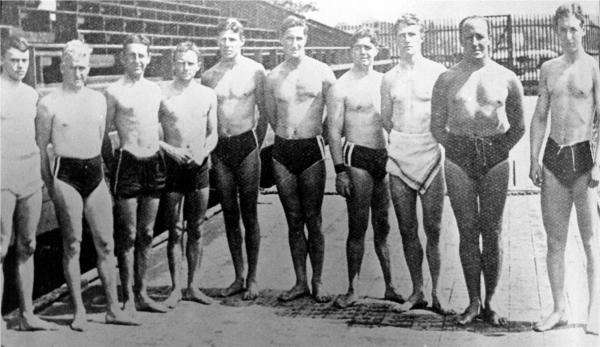Post by StevePulaski on Jan 6, 2018 17:49:08 GMT -5
The Games of the V Olympiad Stockholm, 1912 (1912)
Directed by: Adrian Wood
Directed by: Adrian Wood

The Australian Olympic swim team in Stockholm in 1912.
Rating: ★★★½
Film #1/53; part of the Criterion Collection's "100 Years of Olympic Film" box-set
To conclude another tremendous year for the film company that has done so many invaluable services to cinema, The Criterion Collection has compiled a massive box-set of 53 documentaries, shot over a 100 year period (1912 - 2012), showcasing the Olympics. The films included in the historic collection are remastered, and in some cases, entirely restored as closely as possible to their original state, given the passage of time ages us all and especially film-stock. Despite my slim knowledge of the Olympics, I couldn't resist not owning it; I feel something like this is a true time capsule of cinema and a remarkable collection of specialized history you'd be hardpressed to get even in an opus about the Olympics.
The first film of the box-set is The Games of the V Olympiad Stockholm, 1912, which might indeed be the most remarkable oddity of the entire collection. Conceived as a series of news reels and short videos that depicted a plethora of events at the 1912 Summer Olympics in Stockholm, it came about after the Swedish company A.B. Svensk Amerikanska Film Kompaniet struck a deal with a French studio known as Pathé. Pathé's owner Charles Pathé wanted top quality film-stock, so went about constructing his own by stripping older films of their celluloid and coating them with emulsion in order to produce the kind of film-strips capable of capturing the events crisply as you see them in the documentary. However, due to decomposition, which has gotten the best of far too many projects and film-stock, only about 66% of the film remains.
The creation of one of Criterion's largest box-sets led to director Adrian Wood working to reedit and restore the footage to the best of his abilities, while hiring Donald Sosin to compose a unique score for these silent clips. Through that and more detailed, complicated processes I probably couldn't even begin to adequately summarize, The Games of the V Olympiad Stockholm, 1912 as it currently stands was produced. The end result is a brilliant kickoff to the collection, and a capstone of potential and resilience.
Giving us a rare glimpse at Pre-World War I Sweden, which was under the control of King Gustaf V at the time, the 1912 Summer Olympics unfold with a multitude of events over the course of four chapters. Early in the documentary, we see diving, javelin throwing, and the always amusing tug of war, where beer-bellied brutes use their incredible strength to outsmart and outplay their opponents, who stare them dead in the face with the same goal. During an early session of hurdles, you can very clearly see a jumper completely fumbling the first two bars with sloppy form, the third one eventually causing him to faceplant, only to surprise us all by getting up and clearing every one after that. He might not have gotten the best score, but he shows that nobody gets that far only to forfeit.
A series of equestrian events are held in a sloppy pool of mud, which doesn't seem to deter the spirits of the competitors nor the horses as much as one would assume. Americans and Germans as well as the British, Finnish and Swedish duke out their accuracy skills in the clay pigeons event, where the targets themselves go largely unseen by the audience, leaving us only with the inference that the men are indeed aiming at something. The third chapter shows the arrival of the royal family and consists of extended shots of people marching in unison, their white robes glimmering in the undoubtedly warm but bright conditions. It's during this chapter that we also see pole-vaulting, one of my favorite events, and the intense body contortions and acrobatic tucks that go along with completing a gravity-defying twist over the high-bar, and experience an early marathon. This marathon would prove to be historic for the worst reason, as Portuguese runner Francisco Lázaro became the first athlete to die of exhaustion in the middle of the Olympics.
The Games of the V Olympiad Stockholm, 1912 shows how, during this time, the Olympics were very much a singular and exclusive event. There was obviously no television, so you had to be present, in Stockholm in this case, in order to absorb the magic, or settle for the statlines in the following day's newspaper. Wood and Criterion have put together a gorgeous documentary that emphasizes the most defining principles of the Olympics, and it serves as a terrific achievement of traits that have grown to be synonymous with the games themselves.
Directed by: Adrian Wood.

